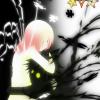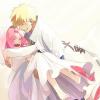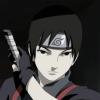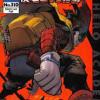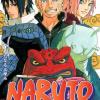The wording/puns is common in Shounen manga, like when the straw hats do a combo. I think the Japanese can easily understand it.
Lighting Katana. Raikiri is just 'lighting blade.' Rai-Katana
Cheery Blossom Shell Smash. Sakura's name with Shell Smash. Sakura Sheru Sumasshu
Sharingan Staff. Is probably the worst/generic/least creative name out of them. Seriously, what did the sharingan have do with a kick? Sharingan Bo
U-Zu-Mikey-Angelo Barrage. Somewhat creative changing Uzumaki to Uzu-Mikey. Naruto-Mikey Rendan.
The Sakura and Naruto combo names were at least somewhat creative. Kakashi was basic/too simple. Sasuke didn't make sense use the chidori or his fire jutsu instead of just naming it after his eyes if he not even going to really use their abilites.
The foot mutants weren't that interesting. They were just generic monsters. It would have been better if they were at least some animal hybrids for consistency. The fox girl is probably going to turn good due to a speech in the last issue.


 Find content
Find content Not Telling
Not Telling


